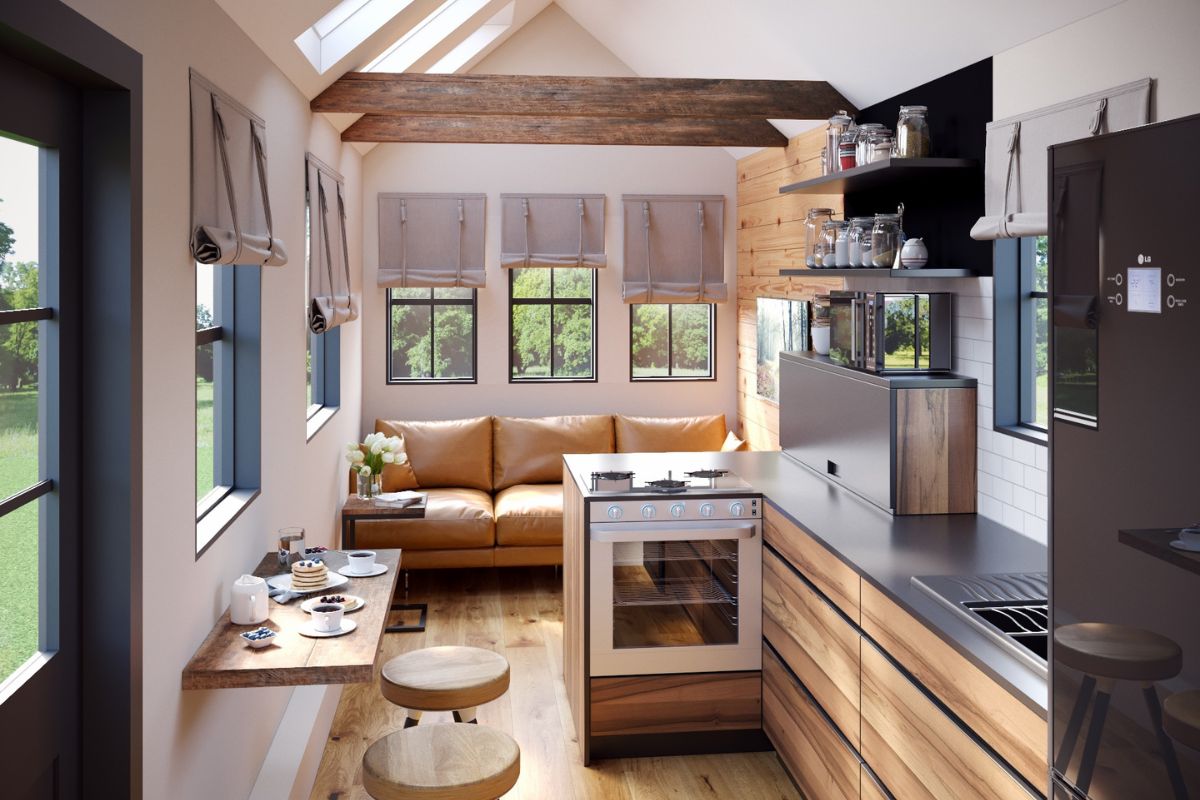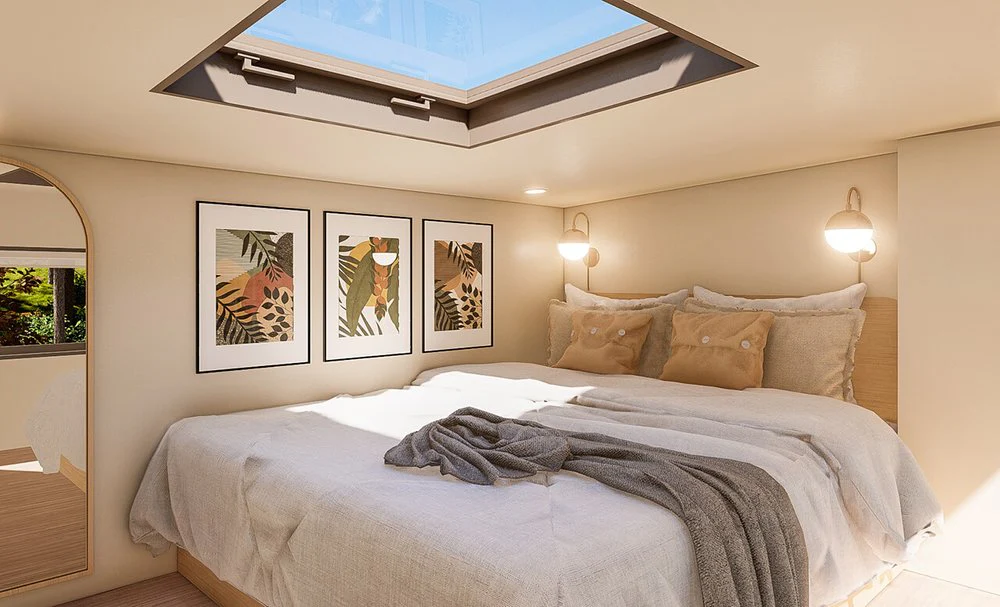Delaware Tiny House Laws And Regulations

Tiny houses have emerged as a popular housing trend in recent years, offering a minimalistic and sustainable lifestyle. These compact dwellings typically range from 100 to 400 square feet and prioritize efficient use of space.
They have gained considerable attention for their affordability, mobility, and reduced environmental impact. Tiny houses often feature innovative design solutions and customizable layouts that maximize functionality and minimize the need for excess possessions.
In this blog post, we will delve into the laws and regulations surrounding tiny houses in the state of Delaware. While the tiny house movement has gained traction nationwide, each state has its own specific guidelines and requirements.
Delaware, with its unique characteristics and zoning regulations, offers a distinct perspective on tiny house living. By exploring Delaware's laws and regulations, we aim to provide aspiring tiny house enthusiasts or homeowners with valuable insights into the legal aspects they need to consider within the state.
Whether you are looking to build, park, or live in a tiny house in Delaware, understanding the local regulations is crucial to ensure compliance and a smooth living experience.
Does Delaware Allow Tiny Houses?
Tiny houses in Delaware are subject to local regulations rather than statewide laws. It is crucial to check the guidelines specific to your city or county to determine the legality of a tiny house in your area. While New Castle County and Kent County typically adhere to the International Residence Code (IRC) guidelines for tiny homes, Sussex County has not officially addressed the matter.
To ensure the legality of your tiny house, you may need to comply with certain construction guidelines established by local authorities. Additionally, zoning laws may come into play, especially if you plan to use the tiny house as a full-time residence. Before embarking on the search for tiny houses for sale in Delaware, it is essential to thoroughly research and understand your local ordinances to ensure compliance with the regulations in your area.
Given the decentralized nature of tiny house regulations in Delaware, it is important to be diligent in gathering information about specific requirements and restrictions that may apply to your desired location. Consulting with local authorities or seeking legal advice can provide further clarity on the guidelines and procedures to follow when considering a tiny house in Delaware.
Several cities in Delaware have embraced tiny houses and are considered "friendly" towards them. It's important to note that this list is subject to change as more cities in Delaware adopt the guidelines outlined in the International Residence Code (IRC).
As of 2022, the following cities in Delaware allow tiny houses:
- Delaware City
- Newark
- Wilmington
- New Castle
- Dover
- Harrington
Whether the evolving economy and preferences of the next generation of homeowners will drive a change in tiny home laws in Delaware remains uncertain. As societal needs and housing trends evolve, there is a possibility that regulations surrounding tiny houses may undergo revisions or updates to accommodate the demand for alternative housing options. The future outlook for tiny home laws in Delaware will largely depend on various factors, including shifting perspectives on housing, environmental considerations, and the influence of advocacy groups.
It is advisable to stay informed about any developments or changes in local regulations pertaining to tiny houses by keeping an eye on official city announcements, consulting with local authorities, or engaging with organizations involved in housing policy. Being aware of potential shifts in tiny home laws will help individuals make informed decisions and understand the evolving landscape of tiny houses living in Delaware.
Tiny Houses Allowed In Delaware
It is important to note that in Delaware, there is no uniform definition for tiny houses. However, certain structures can be classified as tiny houses if they fall within the size range of 120 to 400 square feet. These structures include manufactured homes, factory-built homes, park trailers, custom-built homes on trailers, and others.
When a tiny house is built on a foundation, it is considered a permanent dwelling. On the other hand, if the house is constructed with wheels, it is classified as a Tiny House on Wheels (THOW), which entails additional requirements and considerations.
Understanding the distinction between permanent dwellings and THOWs is significant when navigating the regulations and legal considerations in Delaware. It is essential to consult local authorities and research specific guidelines to ensure compliance with the appropriate classification and any associated requirements for the type of tiny house you intend to build or reside in.
The Delaware Tiny House Building Code
In Kent County and New Castle County, Delaware, tiny houses must adhere to the International Residence Code (IRC) guidelines if they are under 400 square feet in size. To meet the IRC standards, the following criteria must be satisfied:
- If the tiny house is built on a foundation, it should have a minimum land area of 320 square feet.
- The living space within the tiny house must be a minimum of 120 square feet, with at least 70 square feet dedicated to non-sleeping areas.
- The ceiling height must be at least 6 feet 8 inches.
- There should be at least one habitable room with a closet and an openable window.
- The tiny house must also comply with the IRC's requirements for light, ventilation, plumbing, emergency exits, and the installation of smoke and carbon monoxide detectors.
For tiny house on wheels:
When it comes to tiny houses in Delaware, there is a significant distinction between immovable tiny houses and tiny houses on wheels (THOWs). While all tiny houses need to comply with local construction guidelines and permit requirements, THOWs must also adhere to road safety regulations as per Delaware law. The specific requirements for THOWs are as follows:
- Width: THOWs must not exceed a width of 8 feet 6 inches.
- Height: The maximum height allowed for THOWs is 13 feet 6 inches.
- Weight: THOWs must not exceed a weight limit of 10,000 pounds.
It's important to note that if your tiny house exceeds certain dimensions, such as being wider than 8 feet, longer than 40 feet, or containing more than 400 square feet, it falls under the classification of a mobile home according to Delaware's Department of Motor Vehicles (DMV). This designation comes with additional requirements, and titling a mobile home incurs a fee of $35 plus a document fee of 3.75% of its value.
However, if your tiny house is road-safe and smaller in size, it is considered a trailer under Delaware law. The titling fee for trailers is $35, along with a document fee of 4.25% of its value.
Before titling a THOW or trailer, an inspection and approval process is required at the Delaware DMV.
To ensure compliance with the relevant regulations and proper titling of a THOW or trailer, it is advisable to contact the Delaware DMV, familiarize yourself with their specific requirements, and complete the necessary inspections and paperwork.
Land Use and Parking In Delaware
The requirements for land use and parking of tiny houses in Delaware can vary depending on the specific city or county regulations. Here are some general considerations:
- Zoning Regulations: It is important to review the zoning regulations in your area to determine if tiny houses are allowed on the desired property. Different zoning classifications may have specific requirements or restrictions regarding the placement of tiny houses.
- Minimum Land Area: Local regulations may specify a minimum land area requirement for parking or placing a tiny house. This requirement ensures adequate space for the tiny house and any necessary setbacks from property boundaries.
- Accessory Dwelling Units (ADUs): In some cases, parking a tiny house on private property as an accessory dwelling unit (ADU) may be allowed. ADUs are secondary residential units on the same property as a primary residence. However, there may be restrictions on the size, design, and location of ADUs, so it is crucial to consult local ordinances.
- Utilities and Services: Considerations such as access to water, electricity, sewage, and waste disposal should be assessed when parking a tiny house. Ensure that the property can accommodate the necessary utility connections or explore off-grid options if desired.
Limitations and Guidelines for Establishing Tiny House Communities or Living in Existing Communities:
Establishing tiny house communities or living in existing communities in Delaware may have specific limitations or guidelines to consider:
- Zoning and Land Use: Local zoning regulations will dictate whether tiny house communities are permitted and under what conditions. It is crucial to research and adhere to these regulations when establishing a tiny house community.
- Community Restrictions: Existing communities or homeowners' associations may have rules or covenants that restrict the placement or presence of tiny houses. Before moving a tiny house into an established community, it is essential to review any relevant restrictions or seek approval from the community management.
- Building Codes and Safety Standards: Tiny house communities or individual tiny houses within existing communities must comply with building codes and safety standards to ensure the well-being of residents. These requirements may include fire safety, electrical standards, and structural integrity.
- Communication and Collaboration: Collaboration with local authorities, community members, and neighbors is crucial when establishing or integrating tiny houses into communities. Open communication and mutual understanding can help address any concerns or issues that may arise.
Tiny House Advocacy and Future Developments in Delaware:
Local Organizations and Advocacy Groups:
In Delaware, several organizations and advocacy groups support and promote the tiny house movement. These include:
- Delaware Tiny House Association: This organization advocates for tiny house living, provides resources, and supports legislative efforts to promote tiny houses in Delaware.
- Tiny House Delaware: A community-focused organization that aims to educate, connect, and inspire individuals interested in tiny houses living in Delaware.
- Tiny House Movement: This organization promotes sustainable living practices, including tiny houses, and advocates for environmentally friendly housing options.
Ongoing Efforts to Revise Laws and Regulations
There are ongoing efforts in Delaware to revise and update existing laws and regulations related to tiny houses. These initiatives aim to address zoning restrictions, building codes, and permit requirements to create a more supportive environment for tiny house enthusiasts. It is recommended to stay informed about any legislative developments or proposed changes in Delaware's laws through local government channels and advocacy organizations.
Upcoming Events and Developments
Throughout the year, various events and developments related to tiny houses take place in Delaware. These may include workshops, seminars, and exhibitions that provide education, networking opportunities, and insights into tiny house living. Stay updated on local event listings, community newsletters, and online platforms for information on upcoming events specific to tiny houses in Delaware.
As the tiny house movement continues to gain momentum, it is essential to stay connected with local organizations, advocacy groups, and communities to remain informed about the latest developments, legislative changes, and events related to tiny houses in Delaware. Engaging with these entities can provide valuable resources, support, and opportunities to connect with like-minded individuals and stay at the forefront of the evolving tiny house landscape in the state.







.jpg)

